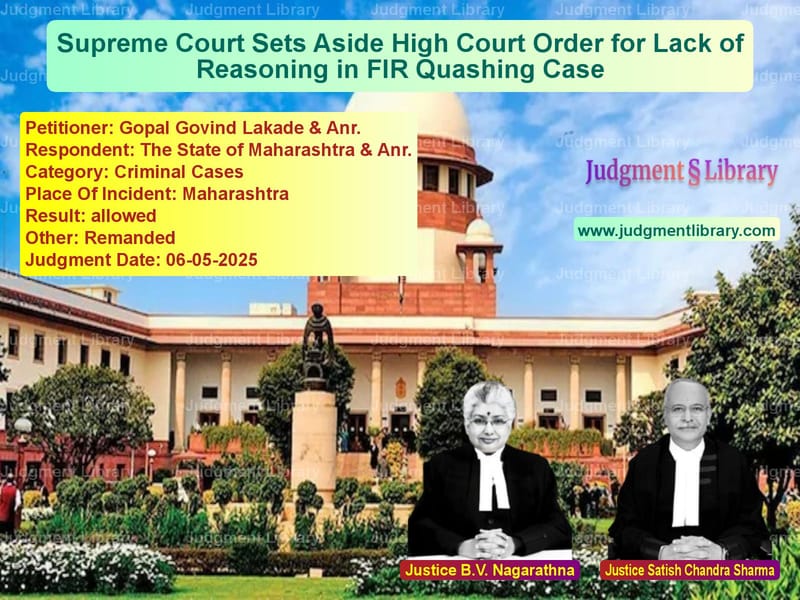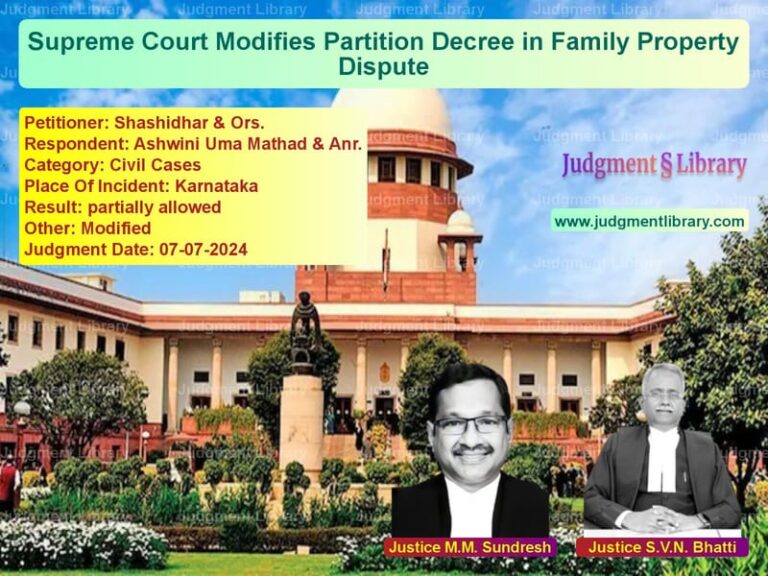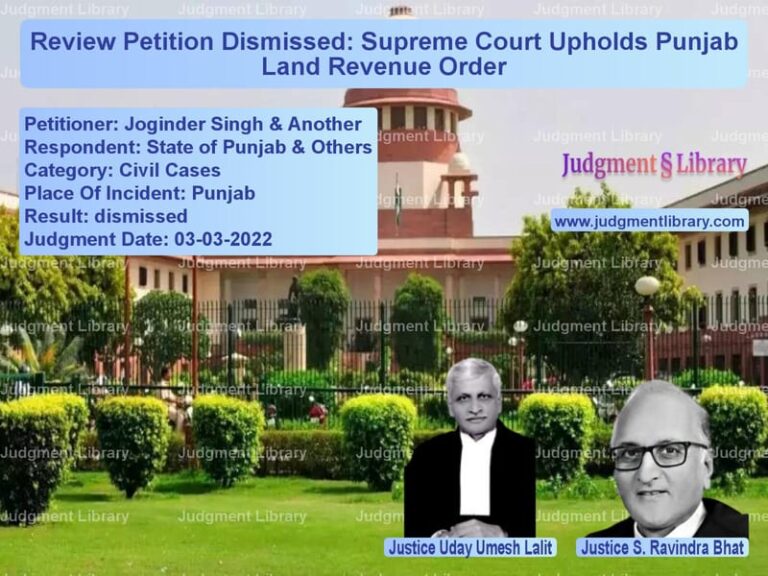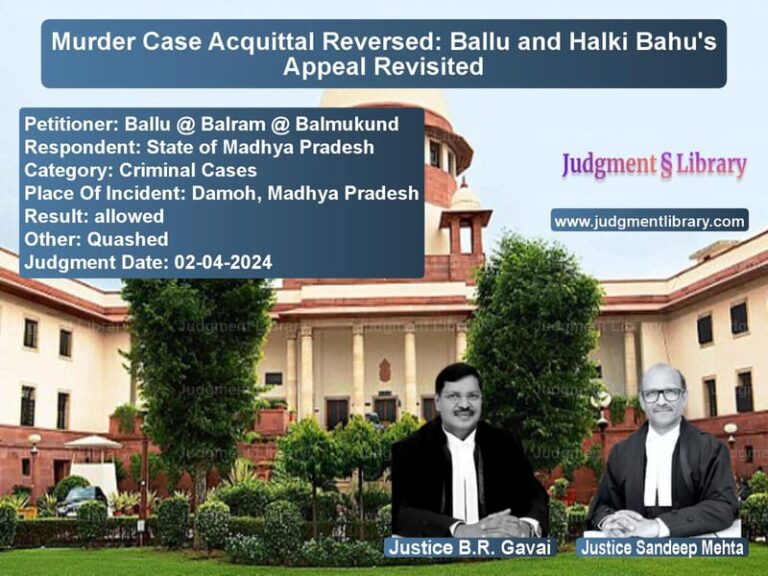Supreme Court Sets Aside High Court Order for Lack of Reasoning in FIR Quashing Case
In a significant ruling that underscores the importance of judicial reasoning and due process, the Supreme Court of India recently delivered a judgment that serves as a crucial reminder about the fundamental principles of natural justice in the Indian legal system. The case involving Gopal Govind Lakade and Another versus The State of Maharashtra and Another represents a classic example of how procedural lapses at the judicial level can significantly impact the rights of citizens seeking legal remedies. This judgment, while seemingly procedural in nature, carries profound implications for how courts at all levels must approach their duties, particularly when dealing with applications seeking quashing of criminal proceedings.
The matter originated from a criminal application filed by Gopal Govind Lakade and another petitioner before the Bombay High Court’s Aurangabad Bench. The petitioners had approached the High Court seeking quashing of an FIR registered against them, contending that what was essentially a civil dispute between the parties had been given an unwarranted criminal color. Such applications for quashing FIRs are common in the Indian legal landscape, where parties often approach higher courts arguing that criminal proceedings are being misused to settle civil disputes or harass opponents.
When the petitioners’ application came before the Division Bench of the High Court on October 30, 2023, the court delivered a remarkably brief order that would become the subject of the Supreme Court’s scrutiny. The High Court’s order simply stated: “After hearing the learned advocate for the applicants for sometime, we are not inclined even to issue notice in this matter. Writ petition stands dismissed.” This terse, two-paragraph order effectively ended the petitioners’ quest for quashing the FIR at the High Court level without any substantive discussion of their arguments or the legal merits of their case.
Aggrieved by this summary dismissal, the petitioners approached the Supreme Court through a special leave petition. During the proceedings before the Supreme Court, the learned counsel appearing for the appellants drew the court’s attention to the impugned order and made several crucial submissions. The counsel argued that “there has been no consideration of the case of the appellant(s) by the Division Bench of the High Court.” This pointed to the complete absence of any judicial analysis in the High Court’s order. The counsel further emphasized that “the High Court was not even inclined to issue notice to the respondent(s) in the application filed by the appellant(s) herein” – highlighting the procedural irregularity in dismissing the petition without even allowing the opposite party to be heard.
The appellants’ counsel presented the substantive basis of their original application, stating that “there is a civil dispute between the appellant(s) and respondent no.2 which has been given a criminal colour and an FIR has been lodged against the appellant(s) herein which was sought to be quashed.” This argument touched upon a well-established legal principle that courts should prevent the misuse of criminal proceedings for settling purely civil disputes. The counsel concluded by submitting that “there being no reason whatsoever for dismissing the complaint, let alone declining to even issue notice, the impugned order may be set aside and the matter may be remanded to the High Court.”
On the other side, the learned counsel for the respondent State adopted a relatively neutral stance, submitting that “appropriate orders may be made in this appeal having regard to the nature and tenor of the impugned order.” This response indicated that the State did not strongly oppose the appellants’ contentions regarding the inadequacy of the High Court’s order.
The Supreme Court bench comprising Justice B.V. Nagarathna and Justice Satish Chandra Sharma carefully examined the matter and delivered a judgment that focused on fundamental principles of judicial administration. The court made several crucial observations that go to the heart of how judicial power must be exercised. The court noted that “the appellant(s) herein had filed a criminal application seeking quashing of the complaint filed against the appellant(s). If the Division Bench of the High Court was not inclined to even issue notice to the respondent(s), then reasons ought to have been assigned for that purpose, or in the alternative, notice should have been issued to the respondent(s) and after giving a fair opportunity to both sides, dismissed the complaint on merits.”
This observation highlights the two appropriate courses of action available to the High Court in such matters. First, if the court was convinced that the petition lacked merit even for issuing notice, it should have provided reasons for this conclusion. Second, if there was any doubt about the petition’s merit, the proper course would have been to issue notice, hear both parties, and then decide the matter with a reasoned order. The High Court had followed neither of these appropriate procedures.
The Supreme Court expressed its inability to comprehend the High Court’s approach, stating that “in the absence of any of the aforesaid options being exercised by the Division Bench of the High Court, we find that the impugned order is in violation of the principles of natural justice inasmuch as we are not able to gather any reason as to why the High Court was not inclined to even issue notice to respondent(s) in the application filed by the appellant(s) herein seeking quashing of the FIR registered against the appellant(s).”
The court’s reference to “principles of natural justice” is particularly significant. Natural justice constitutes one of the foundational pillars of India’s legal system, encompassing two fundamental rules: audi alteram partem (hear the other side) and nemo judex in causa sua (no one should be a judge in their own cause). While the High Court’s order didn’t directly violate the second rule, its failure to provide reasons and its summary dismissal without proper hearing arguably violated the first principle.
The Supreme Court’s conclusion was unequivocal: “In the circumstances, we have no option but to set aside the impugned order and restore Criminal Application No. 2439/2023 on the file of the High Court, by remanding the matter to the High Court with a request to dispose the same on its own merits and in accordance with law.” This disposition ensured that justice would be done by giving the petitioners a proper hearing before the High Court, while also maintaining judicial discipline by requiring the High Court to follow established legal procedures.
This judgment represents more than just the resolution of an individual case; it serves as an important precedent regarding judicial accountability and the requirement of reasoned orders. The Supreme Court has consistently emphasized that speaking orders – those that contain reasoning – are essential for various reasons. They ensure transparency in judicial decision-making, enable higher courts to exercise appellate or supervisory jurisdiction effectively, provide parties with the satisfaction that their arguments have been properly considered, and contribute to the development of jurisprudence through the elaboration of legal principles.
The requirement of reasoned decisions is particularly crucial in matters involving the quashing of FIRs. The power to quash criminal proceedings under Section 482 of the Code of Criminal Procedure (inherent powers of High Courts) or Article 226 of the Constitution (writ jurisdiction) is extraordinary in nature. Courts have consistently held that this power should be exercised sparingly and with caution. When courts do exercise this power – whether by allowing or dismissing quashing petitions – they must provide clear reasoning to demonstrate that they have applied the well-established principles governing such matters.
Over the years, the Supreme Court has developed comprehensive guidelines for when FIRs can be quashed. These include situations where the allegations in the FIR, even if taken at face value and accepted in their entirety, do not prima facie constitute any offence; where the allegations are absurd and inherently improbable; where criminal proceedings are manifestly attended with mala fide intention; and where criminal law is being used as a tool of personal vendetta or to settle civil disputes. When High Courts consider quashing petitions, they must examine whether the case falls within any of these categories and record their findings accordingly.
The Supreme Court’s judgment in this case also highlights the importance of the notice stage in judicial proceedings. The issuance of notice signifies that the court has found at least a prima facie case worthy of consideration. When a court refuses to issue notice, it essentially concludes that the petition lacks even this minimal threshold of merit. Such a decision requires careful consideration and clear reasoning, as it terminates the legal remedy at the very threshold without giving the petitioner the opportunity to fully argue their case or the respondent to present their side.
This case also brings into focus the growing concern about the criminalization of civil disputes in India. The appellants’ contention that a civil dispute had been given a criminal color points to a broader phenomenon where criminal law is sometimes misused to pressurize opponents in commercial or property disputes. The Supreme Court has repeatedly cautioned against this trend and has emphasized that courts should be vigilant in preventing the abuse of criminal process. However, this vigilance must be exercised through proper judicial reasoning rather than summary orders.
The Supreme Court’s decision to remand the matter rather than decide it on merits itself is also significant. This approach demonstrates the court’s respect for the jurisdictional hierarchy and its role as a constitutional court. By remanding the matter, the Supreme Court allowed the High Court to correct its own procedural lapse while maintaining the principle that matters should ideally be decided at the appropriate judicial level.
For the common citizen, this judgment reinforces the assurance that the judiciary will protect their right to a fair hearing. It sends a message that courts at all levels must apply their minds to the cases before them and provide reasons for their decisions. This is particularly important in criminal matters where personal liberty and reputation are at stake.
The judgment also serves as an important reminder to the legal profession about the standards expected from constitutional courts. Lawyers appearing in such matters have a responsibility to assist the court in arriving at a reasoned decision by presenting coherent arguments and relevant legal principles. The absence of proper reasoning in judicial orders affects not only the immediate parties but also the development of law and public confidence in the judicial system.
In conclusion, the Supreme Court’s judgment in Gopal Govind Lakade vs State of Maharashtra represents a significant reaffirmation of fundamental judicial principles. By setting aside the High Court’s unreasoned order and remanding the matter for fresh consideration, the Supreme Court has upheld the standards of judicial accountability, natural justice, and reasoned decision-making. This case will undoubtedly serve as a precedent for future matters where courts at various levels are required to demonstrate the application of mind through speaking orders. It reinforces the idea that justice must not only be done but must also be seen to be done through transparent and reasoned judicial processes.
Petitioner Name: Gopal Govind Lakade & Anr..Respondent Name: The State of Maharashtra & Anr..Judgment By: Justice B.V. Nagarathna, Justice Satish Chandra Sharma.Place Of Incident: Maharashtra.Judgment Date: 06-05-2025.Result: allowed.
Don’t miss out on the full details! Download the complete judgment in PDF format below and gain valuable insights instantly!
Download Judgment: gopal-govind-lakade-vs-the-state-of-maharas-supreme-court-of-india-judgment-dated-06-05-2025.pdf
Directly Download Judgment: Directly download this Judgment
See all petitions in Bail and Anticipatory Bail
See all petitions in Fraud and Forgery
See all petitions in Extortion and Blackmail
See all petitions in Custodial Deaths and Police Misconduct
See all petitions in Judgment by B.V. Nagarathna
See all petitions in Judgment by Satish Chandra Sharma
See all petitions in allowed
See all petitions in Remanded
See all petitions in supreme court of India judgments May 2025
See all petitions in 2025 judgments
See all posts in Criminal Cases Category
See all allowed petitions in Criminal Cases Category
See all Dismissed petitions in Criminal Cases Category
See all partially allowed petitions in Criminal Cases Category







